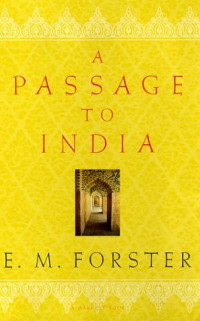Primary data
Title: A Passage to India
Author: E.M. Forster
Originally published: 1924
Publisher: Arnold, London
Read edition: 1989 Penguin Books, London
Editor: Oliver Stallybrass
Description
It was the title of this book that drew my attention. I’ve never been in India but I would love to go there one day. I hoped that this book, even though I’m physically not there, will give me a glance at India.
A passage to India describes the colonisation of India and the effect that those two clashing cultures have. The book starts with Dr Aziz, an Indian, who doesn’t believe that the English can be of any good to his people. As the story continues Aziz seems to change his opinion, friendships are made and Aziz starts to appreciate the English more. When Aziz gets accused of a crime things change. His innocence gets proven but the scars run deep. His belief that the Indians and English can’t be living in peace together during the occupation is strengthen.
Deepening
Theme: clashing cultures
Motives: colonisation, relationships, crime and suppression.
Genre: novel
Setting
The story is set in Chandrapore, an imaginary city near the river Ganges. Two centuries ago the city lay beside an important road between Upper India and the sea. What has been remained from that period are the houses that characterize the small city. Chandrapore has its own bazaars, railway station and hospital. The Ganges is of great importance for the city but its not considered to be holy. The only extraordinary thing of Chandrapore are the Maraber caves who are twenty miles off the city. Chandrapore is a prototypical Indian town.
The streets are mean, the temples ineffective, and though a few fine houses exist they are hidden away in gardens or down alleys whose filth deters all but the invited guests. (chapter I, page 31)
Perspective
Third-person narrator. The narrator is not any kind of character within the story being told. Furthermore the narrator is an omniscient narrator. He has knowledge of time, people, places and events.
Time
The story is written chronological and linear. There are no specific dates mentioned. India was occupied by England from 1858 until 1947. Aziz mentions in the story that queen Victoria is no longer alive. Queen Victoria died in 1901 so the story must have taken place in the first half of the 20th century.
Summary
Indian friends are dining together in the city Chandrapore and discussing about the English whom are colonising India.
Aziz joined in. ‘Why talk about the English? Brrrr…! Why be either friends with the fellows or not friends? Let us shut them out and be jolly. Queen Victoria and Mrs Bannister were the only exceptions, and they’re dead.’ (chapter II, page 35)
Aziz’s opinion changes when he meets Mrs Moore at the mosque. Aziz summons her to take her shoes off but when she tells him that she has done that because she respects the holiness of the place Aziz feels sorry for his rude approach. Mrs Moore tells Aziz that she has come to the city to visit her son Mr Heaslop, the City Magistrate. Aziz and Mrs Moore discover many similarities, they have both been married twice and they both have two sons and one daughter. Aziz invites Mrs Moore and her friend Adele Quested for a picnic in the Maraber caves. Adele came to India to marry Ronny, the son of Mrs Moore. Ronny, Mr Fielding and Professor Goldbole are joining the others to the cave. In the caves Adele realises she doesn’t want to marry Ronny and she tells him. At one point during their expedition all the others went out the cave but Aziz and Adele continued. For a moment they sat on a rock and talked about life.
His friends thought him most unwise to mix himself up with English ladies, and warned him to take every precaution against unpunctuality. (chapter XIII, page 141)
Aziz gets arrested. He is being accused of assaulting Adele in the caves.
‘Heaslop also found out something from his mother. Aziz paid a herd of natives to suffocate her in a cave. That was the end of her, or would have been, only she got out.’ (chapter XX, page 194)
In court Adele gets back on her testimony. She realises that she got a psychological shock in the cave and the echoes had disturbed her. Just like Mrs Moore who suffered from claustrophobia. Mrs Moore in the meanwhile had died on a ship to England.
‘I’m afraid I have made a mistake.’ ‘ What nature of mistake?’ ‘Dr Aziz never followed me into the cave.’ (chapter XXIII, page 231)
The charge gets withdrawn and Aziz is being released from prison. Aziz is very angry at the ‘white’ people and especially at his friend Fielding who is befriending Adele. Both Adele and Fielding return to England. Aziz thinks that Fielding is going to marry Adele there for her money. Aziz vows never to be friends with a white person anymore. Two years later Fielding returns to India. The men meet again. It turns out that Fielding has married the daughter of Mrs Moore. The two old friends start appreciating and loving each other again. But Aziz concludes that they can never be real friends as long as India is being occupied by the English.
If I don’t make you go, Ahmed will, Karim will, if it’s fifty or five hundred years we shall get rid of you, yes, we shall drive every blasted Englishman into the sea, and then’ - he rode against him furiously - ‘and then,’ he concluded, half kissing him, ‘you and I shall be friends.’ (chapter XXXVII, page 316)
Biography
Edward Morgan Foster was an English novelist, librettist (text writer for musical works) and essayist. Morgan was born on the first of January 1879 and died on the seventh of June 1970. Morgan’s father died of tuberculoses and since Morgan was an only child he grew up with only his mother having around him. Morgan inherited £ 8.000 from his great-aunt which enabled him to start a writing career. After university Morgan travelled with his mother to Germany, Egypt and India. Morgan lived with his mother until she died. Morgan wrote eight novels, A Passage to India was the fifth in line.
The things that characterized Morgan were his humanist attitude and his sexuality. Morgan was struggling with his homosexual orientation. He lived a secluded life, taking care of his dominant mother and being a lifelong bachelor.
Morgan has written many works about the irreconcilable differences between cultures. His works relay to the genres modernism, symbolism and realism. It’s obvious that Morgan was inspired by his travels when writing A Passage to India. The scenery he describes comes from his own observation. The clashing cultures can also be related to the author’s point of view. Even though he came from a regular middle class family he didn’t feel like an average person. The fact that he was a convinced humanist is also being reflected in the description that he gives of the different characters. Although all characters differ in their vision he makes it so that the reader can relate to every character and recognize himself in them. Religion is secondary to the other elements of the story.
Like most Orientals, Aziz overrated hospitality, mistaking it for intimacy, and not seeing that it is tainted with the sense of possession. (chapter XIV, page 154)
Sources
A passage to India. Forster, E.M. 1924 Arnold, London. Ed. Stallybrass, O. 1989
E.M. Forster. http://en.wikipedia.org/wiki/E._M._Forster
Evaluation
It was a relief to read a book in which religion is not dominating. A Passage to India is a very original story to my opinion. It gives a good view of the British occupation and the effect that it had on the natives. It wasn’t the story that captured me, it was the way Morgan describes the different cultures and the uncohesiveness. I would recommend this book because it creates a good image of the colonization and clashing cultures.
A Passage to India door E.M. Forster


ADVERTENTIE
Nieuw seizoen Studententijd de podcast!
Studenten Joes, Tess en Annemoon zijn terug en bespreken alles wat jij wilt weten over het studentenleven. Ze hebben het onder andere over lentekriebels, studeren, backpacken, porno kijken, datediners, overthinken, break-ups en nog veel meer. Vanaf nu te luisteren via Spotify en andere podcast-apps!
Luister nu






REACTIES
:name
:name
:comment
1 seconde geleden